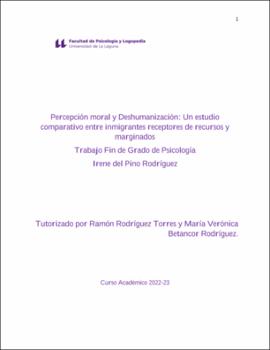Percepción moral y deshumanización: un estudio comparativo entre inmigrantes receptores de recursos y marginados
Author
Pino Rodríguez, Irene delDate
2023Abstract
El contexto social del inmigrante es muy diverso, pudiendo darse situaciones en las que este
recibe ayudas y puestos de trabajo del gobierno, o casos en los que se encuentra marginado, sin
recursos. Esta investigación pretendía estudiar si el hecho de que la población considere que los
inmigrantes marroquíes reciben ayudas y ocupan puestos de trabajo puede influir a la hora de
percibirlos como menos humanos, o incluso a la hora de valorar y justificar un acto negativo que
comete, en comparación con los inmigrantes que no reciben ayudas y se encuentran marginados.
Para ello se presentaron dos relatos descriptivos de un mismo acto negativo (pelea) para cada
contexto del inmigrante, en un diseño experimental intergrupo de un único factor (contexto del
inmigrante) con dos niveles (inmigrante marginado e inmigrante receptor de recursos). Los
resultados mostraron que se percibe como más grave e indignante la conducta negativa realizada
por el inmigrante receptor de recursos, que la del inmigrante marginado, aunque se deshumaniza
a ambos por igual. Por último, se encontró que se tiende a emplear mayor reconstrucción de la
agencia para el inmigrante receptor de recursos frente a la condición inmigrante marginado,
mientras que no existen diferencias significativas entre ambos tipos de agentes de la conducta
cuando se utiliza la reconstrucción moral. The social context of immigrants can be very diverse, with situations where they receive
government assistance and job opportunities, or cases where they are marginalized and lack
resources. This research studies the perception among the general population that Moroccan
immigrants receive assistance and occupy jobs can influence the way they are perceived as less
human, or even affect the evaluation and justification of negative acts committed by them,
compared to immigrants who do not receive assistance and are marginalized. To do this, two
descriptive narratives of the same negative act (a fight) were presented for each immigrant
context, using an intergroup experimental design with a single factor (immigrant context) with
two levels (marginalized immigrant and immigrant resource recipients). The results showed that
the negative behavior performed by the immigrant resource recipients was perceived as more
serious and outrageous compared to the behavior of the marginalized immigrant, although both
were equally dehumanized. Lastly, it was found that there was a tendency to attribute greater
agency to the immigrant resource recipients compared to the marginalized immigrant, while
there were no significant differences between both types of agents when moral reconstruction is
used.





